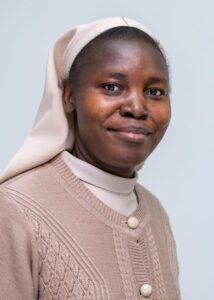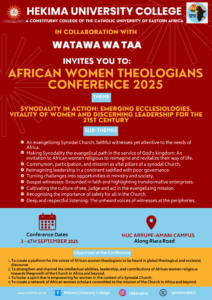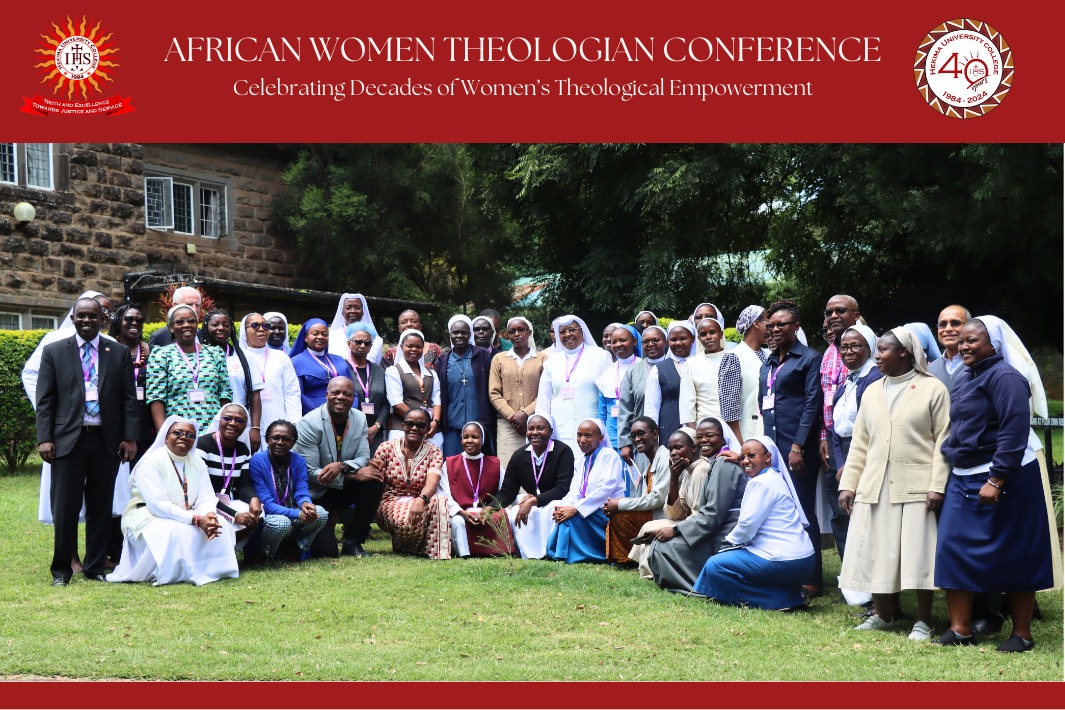By Paschal Norbert
SEPTEMBER 2, 2025 (CISA) – Hekima University College (HUC) , in collaboration with Watawa Wa Taa, will host the Second African Women Theologians Conference from September 3 to 6, 2025, at the HUC Arrupe–Amani Campus, Riara Road, Nairobi.
Following the historic first gathering in March 2024, which set the tone for amplifying the voices of African women in theology and ministry, this second conference is seen as a milestone of continuity, growth, and renewed commitment to fostering a synodal Church that listens, discerns, and acts.
The theme of this year’s conference is: “Synodality in Action: Emerging Ecclesiologies, Vitality of Women and Discerning Leadership for the 21st Century.”

Sr. Dr. Jacinta Auma Opondo, FSSA, Deputy Principal of Academic Affairs at HUC and Chairperson of the organizing committee, underscored the objectives of this edition.
“Although Hekima has endeavoured to offer opportunities to women theologians, the latter’s voices are still seldom heard. The main objective of the first AWT Conference was to celebrate HUC’s contributions to women’s theological empowerment and to create a platform for the voices of African women theologians to be heard in global theological and ecclesial discourse,” she told CISA News.

She added “Having successfully created an awareness that African women can actually contribute substantially to a global discourse, the main objectives of this follow-up AWT Conference are: to create a forum for women to share their experiences, challenges, opportunities and aspirations since the implementation of the Apostolic Exhortation Ecclesia in Africa up to the eve of the implementation phase of the Synod on Synodality; to strengthen and channel the intellectual abilities, leadership, and contributions of African women towards the growth of the Church in Africa and beyond; foster a spirit that is liberating and empowering for women that is critical for making synodality the specific modus vivendi et operandi of the Church.”
The conference will also serve as a platform to build networks among African women scholars dedicated to the Church’s mission. According to Sr. Opondo, this way “the notion of the People of God and communion will obtain substance as members journey together and actively participate in the Church’s evangelizing mission.”
Themes and Key Discussions
This year’s gathering will delve into wide-ranging topics under multi-dimensional themes: ecclesiology, scripture, Church norms, missiology, and psychology, all in relation to synodality.
Among the subjects to be explored are: “Discerning leadership in the model of motherhood,” “Recognizing the importance of safety for all in the Church,” “Women and leadership in a synodal Church,” “Using and creating canonical windows of opportunities for women participating in leadership,” and “Synodality demands solidarity: women and men as full ecclesial partners.”
Others include scriptural reflections such as “Flying with Both Wings: A Theology of Women for a Synodal African Church” and “A woman does not build a village: A contextual exegesis of Luke 10:38-42.” The psycho-theological theme will cover issues like counselling, healing, and addressing sexual and gender-based violence in institutions of higher learning.
Explaining their relevance, Sr Opondo observed: “These themes are considered important because they touch on the areas in which humanity are invited to walk together… what is now needed urgently is to go beyond theoretical discourse into practice. Therefore, as we enter into the implementation phase, carrying out the recommendations of the Final Document and making the Church synodal, we considered these themes important because they actually combine theory and practice; addressing both foundational and practical aspects of journeying together.”
Notably, while the conference highlights African women’s perspectives, it is not exclusive.
“Worth noting is that the Conference although called ‘African Women Theologians’ Conference is not in any way exclusive of men or non-African women. Participation is open to both men and women. The distinction lies in the perspective,” she explained.

Continental Response
The first conference exceeded expectations in participation, and this year’s promises an even broader scope.
“The response has been quite positive. The attendance in the first Conference was far beyond what we had anticipated… Both young and old, the sages and those at the feet of ‘Gamaliel’ explored and raised critical and probing questions, discerned new paths and articulated viable options as reflected in the Proceedings that have just been published,” Sr Opondo recalled.
Looking ahead to this second edition, she said “The coming follow-up Conference is bringing together not only seasoned Theologians but also those who participated in the first and second phase of the Synod on Synodality as well as women who are not in academia but are rich in experience from their ministries (Watawa wa Taa). This is intended to foster a spirit that is not only liberating but also empowering.”
She added that the diversity of participants, from Africa, Europe, and America, underscores the conference’s global relevance.
Challenges and Opportunities
Organizing a continental theological gathering has not been without challenges.
“Some of the challenges that come with such an activity include resources. Financing such a Conference requires huge resources. Planning calls for a lot of sacrifice on the part of the Steering Committee who already have their fulltime responsibilities…,” Sr Opondo admitted.
Yet, she stressed that the opportunities far outweigh the hurdles: “Support from the Principal of HUC and the cooperation of all involved in the planning creates an atmosphere conducive for such planning. Secondly, tapping into the wealth that is found in diversity creates an opportunity to view issues from a broader perspective. Bringing these diverse voices together in a Conference is in itself a synodal experience.”
Looking to the Future
Asked about the long-term impact, Sr. Opondo was optimistic: “I envision that this doing theology in a synodal approach will create a shared space large enough to respond not only to matters of faith but also to pastoral, leadership and ethical issues through sincere and respectful dialogue in a wider context of Church, society and the academia which will further promote and give meaning to walking together.”
The collaboration with Watawa wa Taa has been crucial in sustaining this vision.
“Much of these experiences and the work religious women do remains invisible, little recognized, researched, or documented… Bringing them on board to share some of their experiences was considered an opportunity for learning from one another,” she said. Partnerships such as these, she added, also help mobilize resources for both the conference and the education of women theologians.
